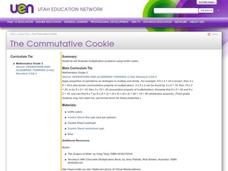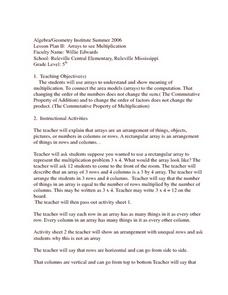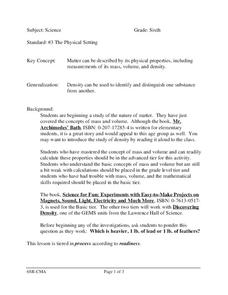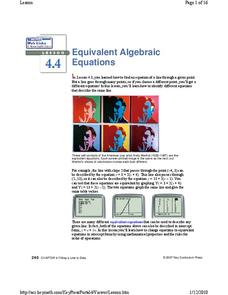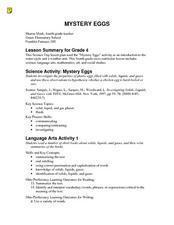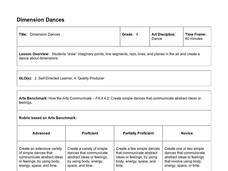Curated OER
The Commutative Cookie
Third graders investigate the commutative properties of multiplication and focus upon the setting of cubes in the correct patterns to solve problems. They differentiate between numbers that have multiple factors and prime numbers....
Curated OER
Mathematics: Prime and Composite Numbers
Sixth graders explore how to apply the commutative property and the rules of divisibility. They examine the difference between prime and composite numbers.
Curated OER
Arrays To See Multiplication
Fifth graders examine multiplication. They construct arrays to demonstrate specific multiplication facts. They identify examples and non-examples of arrays. Students use counters to model the commutative property of multiplication.
Curated OER
Exploring Properties of Rectangular Prisms
Learners explore the properties of rectangular prisms. In this geometry lesson, students identify properties of two and three dimensional shapes. They use Cabri technology to create polygons and solve problems.
Curated OER
Exploring the Properties of Rectangular Prisms.
Students define properties of rectangular prisms. In this geometry lesson, students identify the relationship between two and three dimensional objects. They use Cabri technology to graph their figures.
Curated OER
Physical properties of matter
Sixth graders find the physical properties of matter. In this matter lesson, 6th graders measure mass, volume, and density. Students are broken into 3 tiers with 3 different activities based on their understanding of mass and volume.
Curated OER
Properties of Lines - Parallel and Perpendicular
Sixth graders identify parallel and perpendicular lines in the alphabet. In this line properties lesson, 6th graders use the letters of the alphabet to show parallel and perpendicular lines. Students open a Geogrid Mat on the computer...
Curated OER
The Quest For Power
High schoolers investigate and apply properties of math. In this algebra and physics instructional activity, students define important vocabulary words to create a basic understanding of keywords. They perform experiments using concepts...
EngageNY
Triangle Congruency Proofs (part 1)
Can they put it all together? Ninth graders apply what they know about proofs and triangle congruence to complete these proofs. These proofs go beyond the basic triangle congruence proofs and use various properties, theorems, and...
EngageNY
The Angle-Angle (AA) Criterion for Two Triangles to Be Similar
What do you need to prove triangles are similar? Learners answer this question through a construction exploration. Once they establish the criteria, they use the congruence and proportionality properties of similar objects to find...
Curated OER
Which Triangles are Right
Students apply properties of right triangles to solve problems. In this geometry lesson plan, students identify axioms and theorems using examples.
Curated OER
Sampling Distribution and Estimators Section 6.4
In this distribution worksheet, students examine given situations, determine the probability of an event, identify the standard deviation, and find a specified percentile and quartiles. Five probability story problems are available on...
Curated OER
Equivalent Algebraic Equations
Ninth graders explore linear equations. In this Algebra I lesson plan, 9th graders investigate how different equivalent equations can be used to describe any given line. Students explore how to change equations to equivalents...
Curated OER
Multiplying Polynomials
In this multiplying polynomials worksheet, students multiply polynomials by a single term. This two-page worksheet contains examples, followed by ten problems.
Curated OER
Area, Arithmetic and Algebra
Students model formulas for rectangles and squares. In this area, arithmetic and algebra lesson, students explore the formula for the area of squares and rectangles. They use squares to model the formula for the area and identify...
Curated OER
Mystery Eggs
Students investigate the properties of plastic eggs filled with solids, liquids, and gases and use these observations to hypothesize whether a chicken egg is hard-boiled or raw.
Hawaiʻi State Department of Education
Dimension Dances
Use dance to help learners conceptualize line segments, rays, lines, and planes. They choreograph dances that show dimensional space. Dancers start by pondering space, point, and lines as the teacher draws them in the air. Each...
Curated OER
Sticky Note Math
Sixth graders examine mathematical problems that deal with he division of fractions. Sticky notes are used to model the process.
Curated OER
Colored Drops
Students examine the properties of a liquid that contains water and food coloring and a liquid that contains water, food coloring and a liquid detergent. They interpret their data, describe properties, and make reasonable explanations...
Curated OER
Miles Of Smiles
Students investigate basic mathematical properties to solve multiplication and division problems. They solve word problems that are part of the lesson. Students are required to give written or oral justification for how they solve each...
Curated OER
To Float or Not to Float, That is the Question?
Ninth graders develop operational definition of density, do computations using density equation, categorize pieces of matter as being able to float on
water or not, based on density, explain why some objects sink or float based on...
Curated OER
Direct, Inverse, And Joint Variation
Young scholars engage in a lesson plan that has them practice solving equations using multiplication and division. They practice solving problems using the properties needed and then students practice changing word problems into an...
EngageNY
Markup and Markdown Problems
There is a 100 percent chance this resource will help pupils connect percents to financial literacy. Young mathematicians use their knowledge of percents to find markups and markdowns in financial situations in the seventh segment in a...
Curated OER
Tiling Tessellations
Learners explore tessellations. In this shapes and geometry lesson, students describe the attributes of many of the shapes displayed on an Elmo. Learners create examples of tessellations using pattern blocks.
